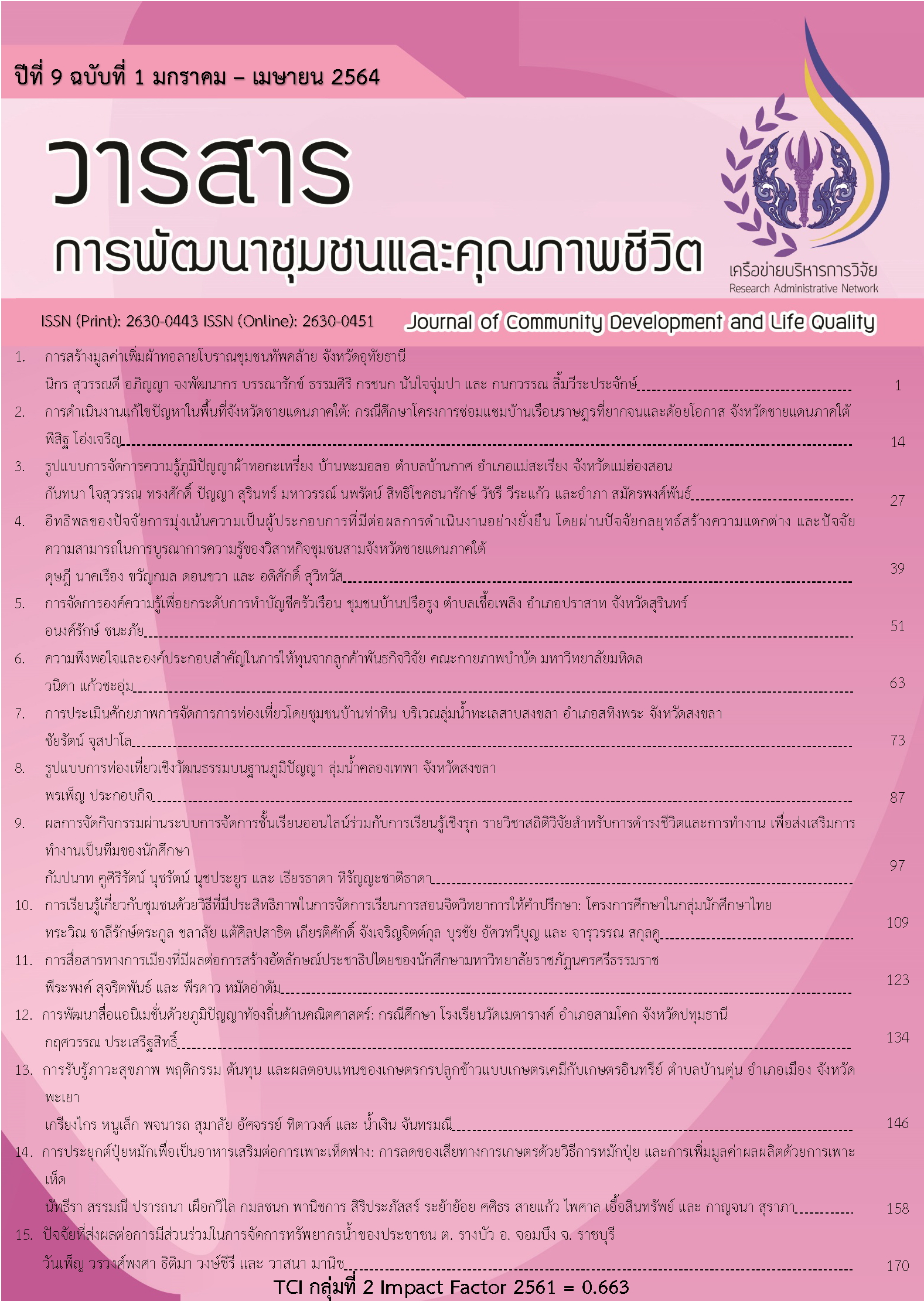การเรียนรู้เกี่ยวกับชุมชนด้วยวิธีที่มีประสิทธิภาพในการจัดการเรียนการสอนจิตวิทยาการให้คำปรึกษา: โครงการศึกษาในกลุ่มนักศึกษาไทย
Main Article Content
บทคัดย่อ
การเรียนทักษะจิตวิทยาการให้คำปรึกษาจะมีประสิทธิภาพเมื่อได้เรียนรู้ในสังคมจริง โครงการนี้มีวัตถุประสงค์เพื่อให้นักศึกษามีพื้นที่ในการประยุกต์ทักษะจิตวิทยาคำปรึกษาที่ได้เรียนในห้องเรียนไปสู่ชุมชน ได้รับประสบการณ์จากการพูดคุยกับสมาชิกชุมชน และวิเคราะห์โครงสร้างชุมชนได้ ผู้เข้าร่วมโครงการเป็นอาสาสมัครนักศึกษาสาขาจิตวิทยา มหาวิทยาลัยธรรมศาสตร์ อาสาสมัครทุกคนทำการสำรวจชุมชนร่วมกับเจ้าหน้าที่ ร่วมอบรมในชั้นเรียน 2 ครั้ง และ ลงเยี่ยมชุมชน ก่อนเข้าร่วมโครงการอาสาสมัครรายงานเป้าหมายและความคาดหวัง และประเมินความรู้ของตนเอง โดยใช้การสนทนากลุ่มเป็นวิธีในการวัดความคืบหน้าของการเข้าร่วมโครงการ เมื่อโครงการสิ้นสุดลง อาสาสมัครรายงานสะท้อนความรู้สึกและสิ่งที่ได้รับจากการวิเคราะห์พบว่าโครงการนี้มีประสิทธิภาพในการส่งเสริมการเรียนจิตวิทยาคำปรึกษา การสนทนากลุ่มแสดงให้เห็นว่า อาสาสมัครมีความเข้าใจเกี่ยวกับโครงสร้างชุมชนเพิ่มขึ้น และสามารถวางแผนเพื่อการทำงานเชิงรุกร่วมกับชุมชนได้ ผลของโครงการสะท้อนให้เห็นว่า การเรียนรู้เกี่ยวกับชุมชนควรจัดควบคู่ไปกับการเรียนในชั้นเรียน เพื่อให้นักศึกษามีความเข้าใจ และสามารถนำไปประยุกต์ใช้ได้
Article Details
กองบรรณาธิการขอสงวนสิทธิ์ในการตรวจและแก้ไขบทความที่เสนอเพื่อตีพิมพ์ในวารสารการพัฒนาชุมชนและคุณภาพชีวิต
บทความหรือข้อความคิดเห็นใด ๆ ที่ปรากฏในวารสารการพัฒนาชุมชนและคุณภาพชีวิต เป็นวรรณกรรมของผู้เขียนโดยเฉพาะคณะผู้จัดทำไม่จำเป็นต้องเห็นด้วย และไม่ใช่ความรับผิดชอบของมหาวิทยาลัยและคณะผู้จัดทำ / บรรณาธิการ
เอกสารอ้างอิง
Ball, C.T. and L.E. Pelco. 2006. Teaching research methods to undergraduate psychology students using an active cooperative learning approach. International Journal of Teaching and Learning in Higher Education 17(2): 147-154.
Boud, D., R. Cohen, and J. Sampson. 2013. Peer Learning in Higher Education: Learning From & With Each Other. Routledge, New York.
Deeley, S. 2010. Service-learning: Thinking outside the box. Active Learning in Higher Education 11(1): 43-53.
Eyler, J., and D.E. Giles. 1999. Where’s the Learning in Service-Learning? Jossey-Bass Higher and Adult Education Series. Jossey-Bass, San Francisco.
Goffe, W.L. and D. Kauper. 2014. A survey of principles instructors: Why lecture prevails. The Journal of Economic Education 45(4): 360-375.
Hill, S.E. 2014. Helping Skills: Facilitating Exploration, Insight, and Action. 4th ed. American Psychological Association, Washington DC.
Hylton, M.E. 2018. The role of civic literacy and social empathy on rates of civic engagement among university students. Journal of Higher Education Outreach and Engagement 22(1): 87-106.
Kyndt, E., E. Raes, B. Lismont, E. Timmers, E. Cascallar, and E. Dochy. 2013. A meta-analysis of the effects of face-to-face cooperative learning: Do recent studies falsify or verify earlier findings? Educational Research Review 10: 133-149.
Marullo, S. 1998. Bringing home diversity: A service-learning approach to teaching race and ethnic relations. Teaching Sociology 26: 259-275.
Moss, R., and M.V. Glowiak. 2013. Therapeutic Alliance and the Helping Relationship. In: D. Capuzzi and D. R. Gross (eds). Introduction to the Counselling Profession. 6th ed. Routledge, New York.
O’Brien, K.M., S. Patel, N. Hensler-McGinnis, and J. Kaplan. 2006. Empowering Undergraduate Students to be Agents of Social Change: An Innovative Service Learning Course in Counselling Psychology. pp. 59-73.
Poomontre, J. and P. Setthawong. 2016. An updated prediction system for the TMRS standardized socio-economic status (SES) classification of Bangkok and metropolitan subjects. Paper presented at the First International Conference on Information Technology. Krabi, Thailand.
Prentice, M. and R.M. Garcia. 2000. Service learning: The next generation in education. Community College Journal of Research and Practice 24(1): 19-27.
Puncreobutr, V. 2018. Professional and cross-cultural competences of Thai graduates to work in ASEAN context. Journal of Community Development and Life Quality 2(2): 225-232. (in Thai)
Sadeghi, R., M.M. Sedaghat, and F.S. Ahmadi. 2014. Comparison of the effect of lecture and blended teaching methods on students’ learning and satisfaction. Journal of Advances in Medical Education and Professionalism 2(4): 146-150.
Schmidt, H.G., S.L. Wagener, G.A.C.M. Smeets, L.M. Keemink, and H.T. van der Molen. 2015. On the use and misuse of lectures in higher education. Health Professions Education 1: 12-18.
Segal, E.A. 2011. Social empathy: A model built on empathy, contextual understanding, and social responsibility that promotes social justice. Journal of Social Service Research 37(3): 266-277.
Segal, E.A., M.A. Wagaman, and K.E. Gerdes. 2012. Developing the social empathy index: An exploratory factor analysis. Advances in Social Work 13(3): 541-560.
Tlhoaele, E., C. Suhre, and A. Hofman. 2016. Using technology enhanced, cooperative, group-project learning for student comprehension and academic performance. European Journal of Engineering Education 41(3): 263-278.
Wandersman, A. and M. Nation. 1998. Urban neighborhoods and mental health: Psychology’s contribution to understanding toxicity, resilience, and interventions. American Psychologist 53(6): 647-656.
Williams, A.S., P.M. Patel, N.L. Beucke, and R.J. Koopman. 2018. Community-based medical student nutrition counseling training for low-income families. Primer 2(5).


